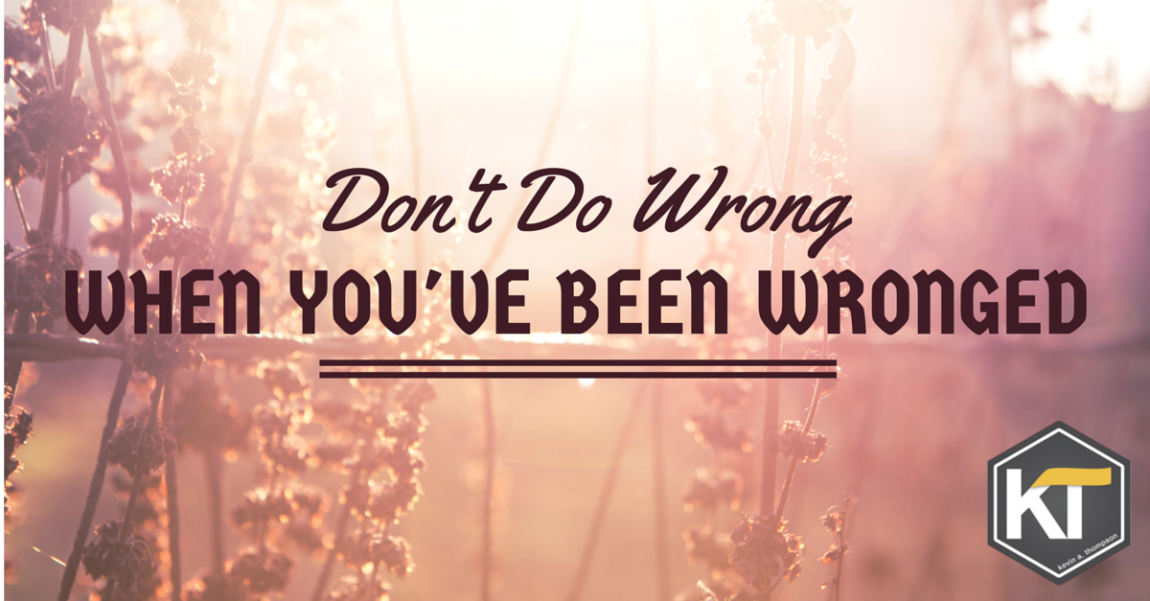They will do you wrong.
No matter how good you are. No matter how kind or loving your act. No matter how perfect your actions seem to be. Someone at some point will do something to you which you do not deserve.
One of the guarantees of this world is that you will be done wrong.
It might be out of spite.
It might be from revenge.
It might even be from the heart of good intentions, but the action will be something you didn’t deserve.
Maybe you will lose your job or your kid won’t make the team or you will lose your biggest client.
You will suffer in a way you do not deserve. (See: A Map for Navigating Life’s Disappointments)
When this happens, there is one simple rule:
Don’t do wrong when you’ve been wronged.
When we have been unfairly treated (whether in reality or just our perception) we face tremendous temptation to make bad choices. Anger, hurt, disappointment, frustration, embarrassment, and surprise are all emotions commonly associated with having been wronged. Not a single one of those emotions lead to better decision-making. They all hinder good decisions. (See: When Power Intersects a Lack of Appreciation)
Bad decisions compound any negative event which happens to us.
Two primary reasons we should not do wrong when we’ve been wronged:
1. It will make them think they are right. This isn’t the highest of motives, but it speaks to our desire. Whenever we do wrong after we have been wronged, it justifies the actions another has taken against us. Uncertain of what to do, I’ve taken actions against others only to have their responses prove my decision. Had they responded differently, I would have second-guessed my actions. The same is true for others. Rarely is someone certain about their actions. Most every action is taken with some doubt. People are still making up their minds about what they have done after they have done it. If you’ve been done wrong, make someone regret it. (See: What the Smartest People Rarely Know)
Fired? Respond humbly. Don’t burn bridges. Be a good employee for someone else.
Dumped? Act like a lady or a gentleman. Don’t talk bad about the person. Become a good girlfriend or boyfriend the next time.
Slandered? Don’t slander back. Stand up for truth where possible. Out last the accusation through good decisions.
When someone responds poorly to something which has happened to them it gives credibility to the original action. Others see the response and assume we deserved to be treated poorly.
2. It will cause more harm than the original issue. More importantly than what it does to others, we should choose wisely based on its effect toward us. We are hindered far more by what we do to ourselves than what others do to us. (See: The One Piece of Advice I Would Give a 7th Grader)
Many people wrongly conclude their lives are in a bad place because of what someone else did to them. Sometimes it is true. We can suffer greatly from the decision-making of others. In the immediate aftermath of someone else injuring us, we can be devastated—abuse, divorce, job loss, victimization from crime, etc.
Yet soon after the negative event, we begin to regain responsibility for our lives. We do not always control what happens to us, but we do always control our response. While the action of the other may have been injurious, rarely does one action by another person define our whole lives.
Far more often, our lives resemble the choices we have made in response to life’s events rather than the choices others have made toward us. (See: The Secret to a Good Decision)
Whenever we experience an unfair circumstance in life, we are in great danger of allowing one event become the catalyst for a series of bad choices. Without deep reflection, an awareness of human tendency, and an intentional process to protect us from ourselves, we will make bad decisions whenever we’ve been done wrong. Our decisions will feel right, justified, and self-satisfying, but they will not lead to the results we desire.
We must choose a different way.
Don’t do wrong when you’ve been done wrong.




3 Responses to Don’t Do Wrong When You’ve Been Wronged